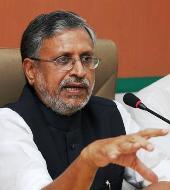 Bihar Deputy Chief Minister and Finance Minister Sushil Kumar Modi was on Monday elected the new chairman of the Empowered Committee of State Finance Ministers, which is spearheading the implementation of Goods and Services Tax.
Bihar Deputy Chief Minister and Finance Minister Sushil Kumar Modi was on Monday elected the new chairman of the Empowered Committee of State Finance Ministers, which is spearheading the implementation of Goods and Services Tax.
Modi, who also handles the finance portfolio in the Bihar government, replaces Asim Dasgupta, who had served in the post for over a decade since the formation of the body.
The committee had earlier overseen implementation of the value added tax system across the states.
"The substantive bussines of today's meeting was the election of the chairman. Sushil Modi, the Deputy Chief Minister and Finance Minister of Bihar, has been elected unanimously as the chairman of the Empowered Committee of State Finance Ministers," Union Finance Minister Pranab Mukherjee told reporters in New Delhi.
Mukherjee had invited all state finance ministers to Delhi on Monday for the meeting of the Empowered Group after a gap of almost five months.
The post of the chairman of the group fell vacant after the defeat of Dasgupta in the West Bengal Assembly polls in May.
Dasgupta, who was the West Bengal Finance Minister, had headed the Committee since its formation in early 2000s.
One of the major tasks before Modi, as the new chairman, would be to build a consensus on the proposed goods and service tax regime, which has been pending for years.
Mukherjee, however, said that details of the agenda are still to be worked out.
"Now, they (state FMs) are having discussions.
"Some formalities will have to be worked out and after that, the committee will work out a detailed work programme," Mukherjee said.
Interestingly,
The Centre had introduced a Constitution Amendment Bill in the Lok Sabha in the last Budget Session to pave the way for implementation of the new tax regime.
The Bill, however, is being opposed by the states, especially the Bharatiya Janata Party-ruled ones, as well as Bahujan Samaj Party-ruled Uttar Pradesh, who say its provisions would curtail their power to levy taxes.
The GST would subsume most of the indirect taxes like excise duty and service tax at the central level and VAT on the state front, besides local levies.
Implementation of GST, considered to be a major tax reform, has been stuck for years due to differences between the Centre and some states over the new structure.
The Constitution Bill would need the approval of two-thirds of Parliament and half of India's 28 states to become a law.
Hence, BJP support is crucial at the state as well as the central level.
After the election of Modi, the BJP-ruled states hoped that the new chairman would be able to build a consensus on the issue.
"We are all very positive that under the leadership of Modi all the issues which have been pending between the Centre and the states, all the issues related to VAT and GST, will be amicably solved," Gujarat Finance Minister Saurabhbhai Patel said.
Meanwhile, the next meeting of the Empowered Group has been fixed for the second half of August.
"Next round of meeting will be held in second half of August," Delhi Chief Minister Shiela Dixit, who attended Monday's meeting, said.
Image: Sushil Kumar Modi









